Bill of Materials Wizard Ribbon
The following table provides a quick reference to the BOM Wizard ribbon and its functions.
|
| |
|
Icon
|
Description/Functionality
|
|
Login/Logout
|
This will either log you into or out of EBS depending on your status (terminate or reinstate your Oracle database connection).
The icon will change depending on your current status. If you are currently logged in then the icon will show as ‘Log Out’. If you are not logged in the icon will show as ‘Log In’.
|
|
About
|
Displays product and package version information along with licensing and usage data.
You need to click on this button to load a new Licence Key, Modify/add a user of the Wizard or ‘View Usage’.
|
|
Show/Hide
Login Info
|
This button toggles the display of the ‘Login Info' information on the ribbon.
|
|
Forms
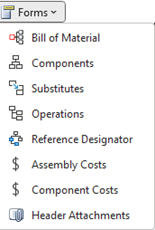 |
The ‘Forms’ button shows a list of available forms applicable to the mode chosen. For example, if ‘Bill of Materials’ mode is chosen then this button will show the options pictured on the left for data entry.
|
|
Descriptive Flexfields
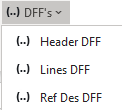 |
A form will open to enable the descriptive Flexfields information to be entered. Use of this form is optional as you can copy and paste or enter directly into the cells in the worksheet if you prefer.
Each form on the ribbon has an associated DFF Form and icon. The DFF icon will display if the descriptive Flexfields has been configured within Oracle.
The following descriptive Flexfields can be loaded using the Wizard:
Bill of Materials Information
Components Information
Reference Designator Information
|
|
Select Template
 |
This icon will open the ‘Generate Template’ form to select a template created by your System Administrator.
This icon will change to display the Mode and the Template name if one is selected.
|
|
New Sheet
|
A new worksheet will be created based on the selected template.
If the Template is invalid or not yet selected, the ‘Generate template’ form will appear.
|
|
Validate Option
 |
Choose whether to ‘Validate Only’,
or
‘Validate and Update or ‘Validate Concurrent’ when uploading lines to the API.
|
|
Clear Status Columns
|
This icon enables you to remove status column information from the worksheet.
|
|
Compare Worksheets
|
Use this icon to compare two worksheets cell by cell and mark any differences. Ideal for comparing Bills of Materials between sheets.
|
|
Format Data
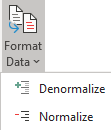 |
Used for formatting data by adding duplicate parent rows based on child rows and removing duplicate parent rows respectively.
Denormalize Data - This function is useful for when you need to sort the data in Excel. Click the Denormalize button and it will duplicate header data for each of the rows containing child data. Once you are finished sorting the data then you can Normalize the data to remove the duplicate headers and prepare it for upload.
Normalize Data - This function is used to prepare data for upload in the Wizard, whether you’ve just denormalized it for sorting, or imported the data from an external source with duplicate headers, Normalization will remove duplicate headers.
Normalization will only affect sections that have children with multiple rows of data.
Both functions will affect all the records on the active worksheet.
|
|
Upload
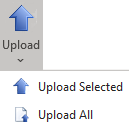 |
Upload Selected - The selected rows (as indicated by the cursor) will be validated/loaded into Oracle EBS.
Upload All - All rows in the worksheet (that have not already been processed) will be validated/loaded into Oracle EBS.
|
|
Attachments
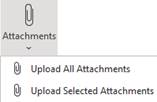 |
Allows users to choose to either ‘Upload All Attachments’ or ‘Upload Selected Attachments’ to Oracle EBS.
|
|
Download
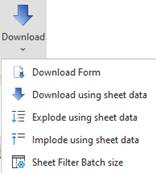 |
Download Form - A form will open that will allow you to choose Assemblies to be extracted from Oracle Bill of Materials and populate into the worksheet.
Download using sheet data - After entering data or information into the worksheet, use your cursor to highlight the details and then use this icon to download all details which are associated with these values.
Explode using sheet data – The data on the sheet is used to explode multiple items simultaneously. This will download all Items involved in the Assembly(s) to the level specified
Implode using sheet data – The data on the sheet is used to implode multiple items simultaneously. This will download a set of bill information based on the component specified.
Sheet Filter Batch size – This icon allows modifications to the ‘Download using sheet data’ functionality.
|
|
Display Option
 |
Used as a filter in the Download.
This will download the Components of Bills based on the following choices:
All – Downloads all Bill of Materials regardless of effective dates.
Current – Downloads only those Bills with Components that are currently active based on the effective date specified in the Effectivity Date ribbon control.
Current and Future – Downloads only those Bills with Components that are current or due to be implemented in the future, based on the effective date specified in the Effectivity Date ribbon control.
|
|
Include Common Components
|
This controls whether common Components are to be downloaded as a part of a common Bill of Materials. If they are required, set this to ‘Yes’ if not set it to ‘No’.
|
|
Effectivity Date
|
This is used in conjunction with the ‘Display Option’ control in the ribbon. This is used as a substitute for system date to filter Components by effective date when downloading.
Click on the icon to open the calendar to set the date.
|
|
Cost Type Option
|
When downloading, a Cost Type can be chosen through this control. Setting this will download the costs for the Assembly and Components.
Click on the icon to open the ‘Download Settings’ form, and select the Cost Type Option for the Organization from the LOVs.
|
|
Include Costs
|
If costs are not required as a part of the download, you can set this control to ‘No’ and no costs will be downloaded into the Assembly and Component Costs sections.
|
|
Expl/Imp Level
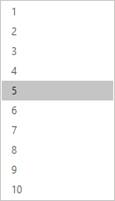 |
Set the level to Explode or Implode using this field.
|
|
View Concurrent Request
|
Open the Oracle Requests form to view the concurrent process.
|
|
Refresh API Status
|
Refresh the Status columns after a concurrent upload.
|
|
Logging
|
Click the ‘Logging’ button before upload/download and a new worksheet will record all actions taken by the Wizard. This new worksheet will be labelled ‘M4A – Query Log’ and will hold all upload/download information.
This is helpful for ensuring that More4apps has all the information required to resolve your issue.
|
|
Help
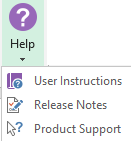 |
Click this icon for help on the functionality of this Wizard.
The three options are:
User Instructions – Link to the More4apps online User Guide to find detailed explanation on the Wizard.
Release Notes – Link to the list of all version releases for the Wizard.
Product Support – Link to the More4apps support page where issues/requests can be logged by completing the form details.
|
Refer to section: